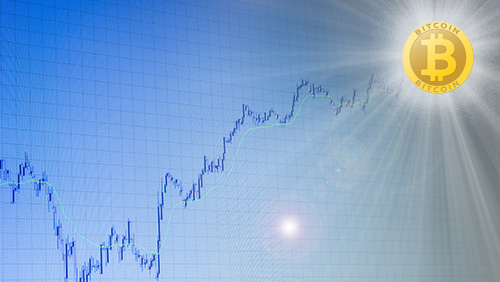For the first time in three years, bitcoin is back over $1,000.
 The popular digital currency kicked off the new year by jumping 2.5 percent to $1,022 on Europe-based Bitstamp exchange on Sunday—it’s highest since December 2013. That price was still shy of the $1,137 record it achieved in late 2013 before a hack on the now infamous Mt. Gox exchange saw bitcoin’s price plunge to under $400.
The popular digital currency kicked off the new year by jumping 2.5 percent to $1,022 on Europe-based Bitstamp exchange on Sunday—it’s highest since December 2013. That price was still shy of the $1,137 record it achieved in late 2013 before a hack on the now infamous Mt. Gox exchange saw bitcoin’s price plunge to under $400.
Bitcoin’s weekend milestone marks a vibrant 2017 beginning for the cryptocurrency. This year, analysts expect the digital currency to ramp up another 165 percent and hit over $2,000, thanks to U.S. President-elect Donald Trump’s “spending binge.”
Trading experts chalked up the recent surge in bitcoin’s price to the increasing demand from buyers, who sought alternative assets following the shooting death of Russia’s envoy to Turkey as well as the attack that left 12 people dead in Berlin. China, where majority of trading occurs, also saw an increase in demand for bitcoin as the pressure on the Chinese yuan weakens. India’s demonetization efforts and recent crackdowns on moving money abroad have also prompted a massive adoption of the cryptoccurency in the country.
EU wants to identify bitcoin users
Meanwhile, the European Parliament and the Council of the European Union are seeking to amend a directive on money laundering and terrorist financing prevention, which could result in requiring digital currency exchanges and wallets to identify suspicious activities.
The directive established a framework that will require EU member states to identify risks related to money laundering and terrorist financing. But since “certain modern technology services” have started gaining popularity as alternative financial systems, the two bodies are proposing additional measures to improve the existing framework.
In the proposal, they noted that providers of virtual currency exchange services and fiat currencies are under no obligation to identify suspicious activities, which could enable terrorist groups to transfer money into the EU’s financial system or within virtual currency networks by concealing transfers.
“[N]ational Financial Intelligence Units [FIUs] should be able to obtain information allowing to associate virtual currency addresses to the identity of the owner of virtual currencies. In addition, the possibility to allow users to self-declare to designated authorities on a voluntary basis should be further assessed,” the proposal stated.